“Duncan”
I love to have a beer with Duncan
Oh I love to have a beer with Dunc.
We drink in moderation
And we never ever ever get rollin' drunk
We drink at the Town and Country
Where the atmosphere is great
I love to have a beer with Duncan
'Cause Duncan's me mate
I love to have a beer with Duncan
'Cause Duncan's me mate
Music and lyrics were written by Pat Alexander
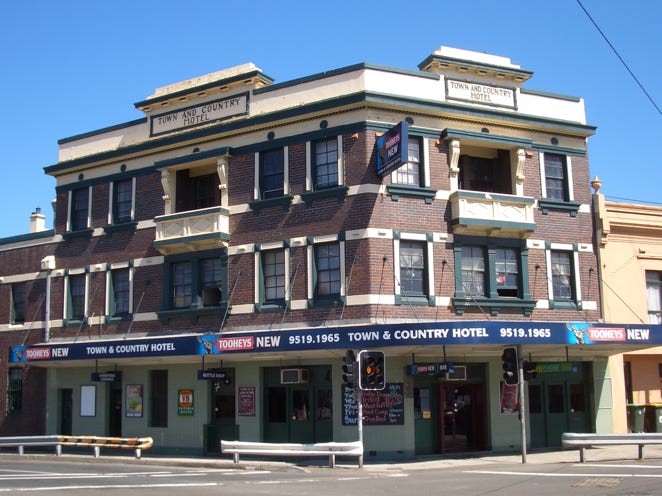
The Town and Country Hotel, St Peters, Sydney 2006.
J Bar via Wikimedia Commons
…’ ”Duncan"'s writer Pat Alexander had met Duncan Urquhart here in 1976 for drinks, attempting to sell him life insurance. He failed to make the sale, but realised Urquhart merely enjoyed having a drink with him.
The song was recorded by Slim Dusty in October 1980. The official video for the song was filmed at the Town and Country Hotel and starts with Duncan Urquhart sitting to Dusty's left and Pat Alexander to Dusty's right.’ https://en.wikipedia.org/wiki/Duncan_(Slim_Dusty_song)
…”In many cases, pubs were the first structures built in newly colonised areas, especially on the goldfields, and new towns often grew up around them. Pubs typically served multiple functions, simultaneously serving as hostelry, post office, restaurant, meeting place and sometimes even general store. Pubs proliferated during the 19th century, especially during the gold rush that began in the 1850s.” https://en.wikipedia.org/wiki/Australian_pub
Until the late 1980s, pubs in Australia were forced by the liquor laws to provide accommodation. In the late 1800's hotels were opened as staging posts for Cobb and Co. this gave rise to the names of the Exchange and the Royal Mail hotels. Hotels also catered for railway passengers, or for the workers who were laying rail line during the wave of railway building in the late 19th and early 20th century, hence the name Railway hotel . The Commercial hotels were so named because commercial travellers, or sales reps, needed accomodation as they journeyed around the country. Some Pubs were named after British nobility, e.g.the Royal, or after a local landmark e.g. the Courthouse.
…”Located on major transport routes, in new towns, at river crossings, major junctions, mining and railway towns, ports and seasides, pubs were often the first business in a new township and the last to close when a town was abandoned. They have provided venues for religious worship, theatrical entertainment, meetings small and large, public and private, balls, banquets, fetes and sporting events, and have been used as school classrooms, commercial rooms for travelling salesmen, electoral polling places and venues for inquests. As well as planned events by both publican and the community, pubs are renowned for unplanned interaction between regulars and strangers.” Patricia Sumerling, ‘Pubs’, SA History Hub, History Trust of South Australia, http://sahistoryhub.com.au/subjects/pubs, accessed 13 November 2017.
The Grants of Murrumburrah & Harden, New South Wales.
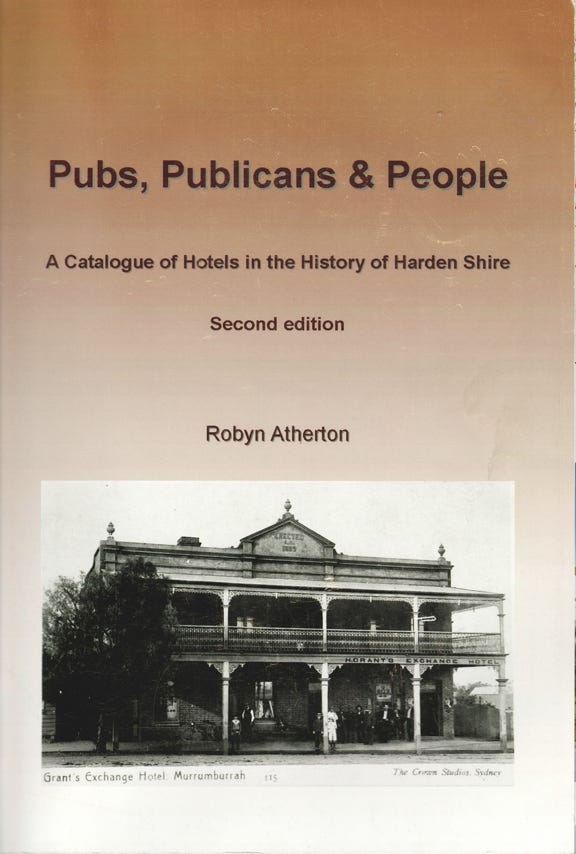
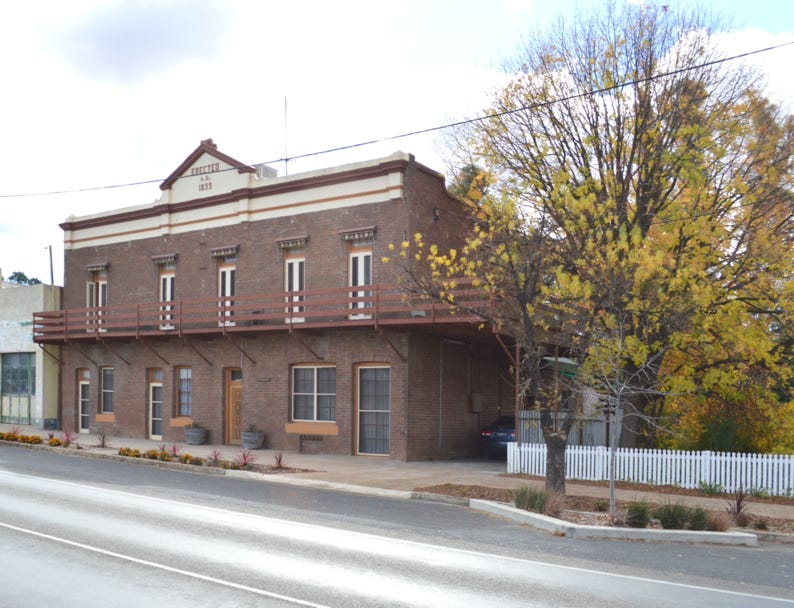
The former Exchange Hotel in Murrumburrah, NSW
By Mattinbgn (talk · contribs) (Own work), via Wikimedia Commons
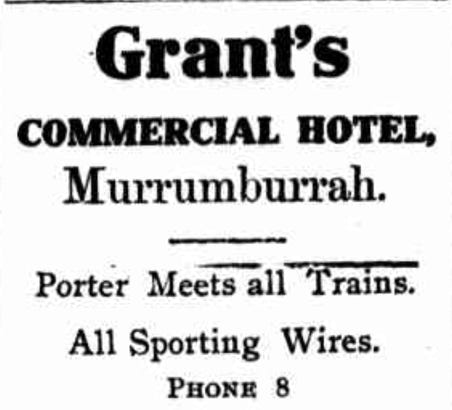
Murrumburrah Signal and County of Harden Advocate
Mon 20 May 1912 Page 1
Pubs, Publicans & People. A catalogue of hotels in the history of the Harden Shire.
Available at Harden Murrumburrah Museum
or contact the author Robyn Atherton robynatherton@bigpond.com
- Frederick Grant – Shamrock Hotel Murrumburrah 1889
- Henry Grant – Exchange Hotel Murrumburrah 1907 – 1910
- Amy Grant – Commercial Hotel Murrumburrah 1912-1917
- Randolph H Grant – Commercial Hotel Harden 1916
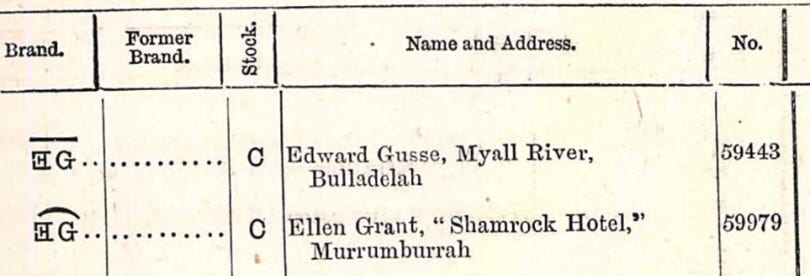
1889 - New South Wales, Australia, Government Gazettes, 1853-1899
via Ancestry.com
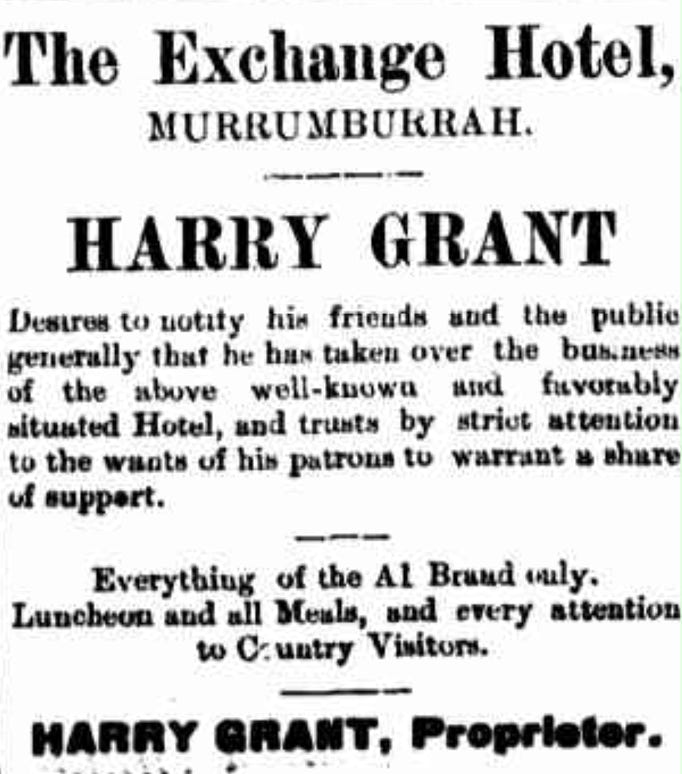
Murrumburrah Signal and County of Harden Advocate Tue 15 Oct 1907 Page 5
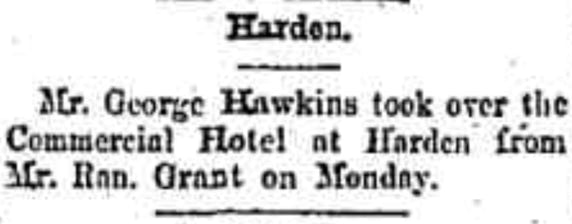
Cootamundra Herald (NSW : 1877 - 1954) Tue 9 Jan 1917 Page 1
The Grants of The Commercial Hotel, Wyandra, Queensland.
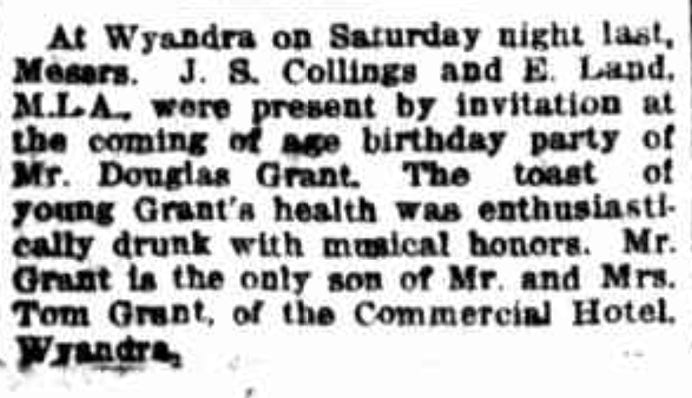
Daily Standard (Brisbane, Qld.) Tue 24 Apr 1923 Page 6
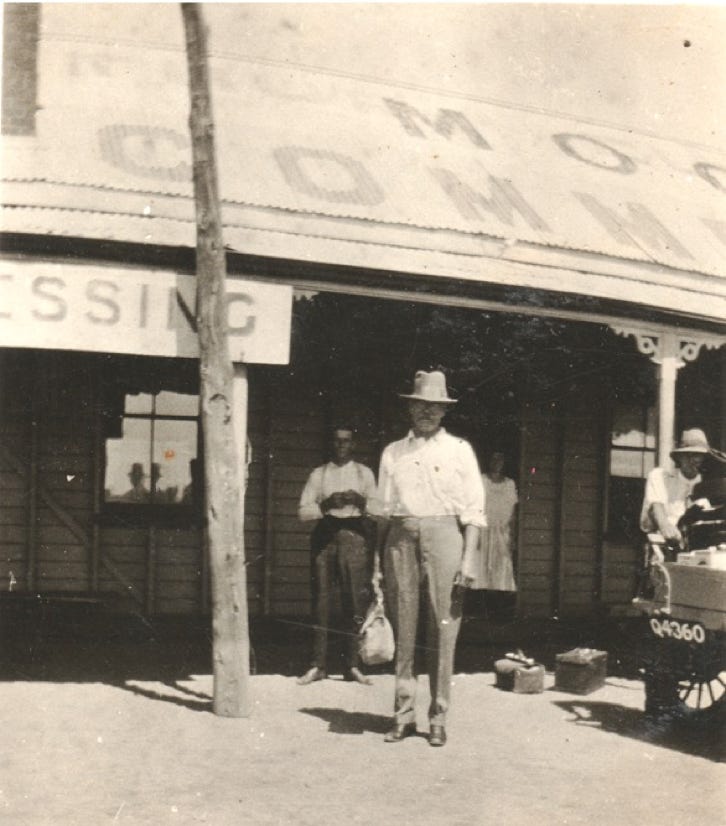
Thomas Henry Grant worked in Cunnamulla as a Hairdresser, and then some years later as a Butcher. In the years in between he worked as a hairdresser based at the Commercial Hotel Wyandra. His wife Margaret Jane ran the hotel with him, and their son Douglas was the barman.

Australia, Electoral Rolls, 1903-1980 via Ancestry.com
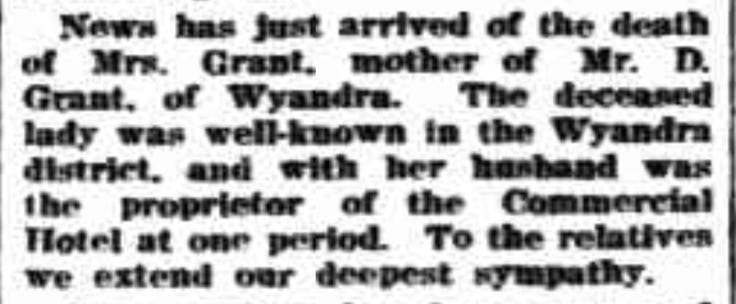
The Charleville Times (Brisbane, Qld.) Fri 19 Oct 1934 Page 3

Grant
- GRANT - A ‘Mud Map’ history of the Grant branch.
- GRANT nee DOYLE - Ireland to Ipswich
- GRANT nee DOYLE - Working on the railway and farming at Walloon.
- GRANT nee DOYLE - Family photos in Ipswich and Rockhampton.
- GRANT/DOYLE - Cunnamulla 1903 - Hairdressing and raising a family.
- GRANT/FRAZER - Wyandra 1923 - The Commercial Hotel
- GRANT - Wyandra 1925 - A Hotel & Hairdressing, and Fishing Trips
- GRANT - Cunnamulla 1927 - A Butcher shop in a drought.
- GRANT - Brisbane - West End: Hardgrave Rd., Boundary St., and Blakeney St.
- GRANT - Toowong Cemetery
- GRANT - New South Wales - 1861 Binnalong and Harden-Murrumburrah
- GRANT/HOLT - Tasmania - Bagdad 1832 - William Holt and Mary Ann Holt (nee Peters)
- GRANT/HOLT/PETERS - Hobart 1810 - Mary Ann Holt daughter of Thomas & Mary Ann Peters
- GRANT/HOLT/PETERS - You get to choose!
- GRANT/HOLT - William Holt of Bagdad Tasmania
- GRANT/HOLT - William Holt of Castlemaine Victoria
- GRANT/HOLT - A new name and a new life.
- GRANT/GORMAN - Great-great grandma Ellen Bridget Gorman
- GORMAN - Dublin to the Dapto District
- GRANT - The Children of Frederick and Ellen Grant
- GRANT - Where the atmosphere is great.
- GRANT/HOLT Summary - Thomas Peters & Mary Ann Hews to Bernadine Monica Grant
- Grant - Doyle - Holt - Gorman - Saunders - Peters - Hews - The case is never closed.

